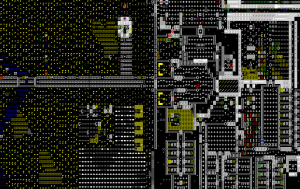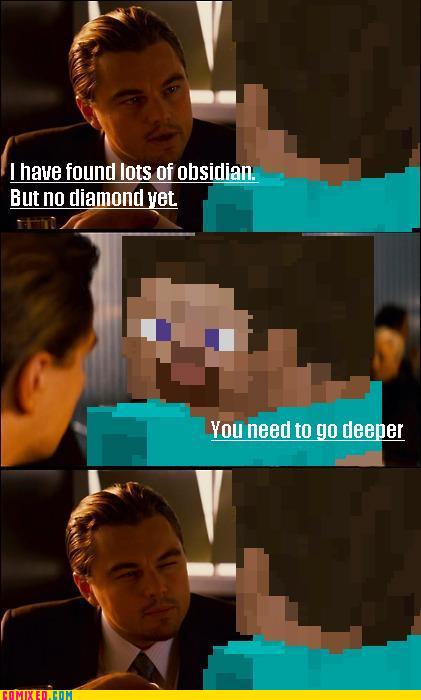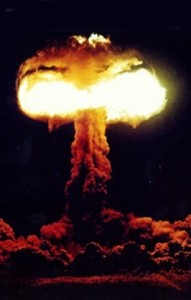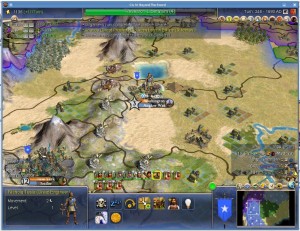Yesterday Pike and I finished a fairly long game of Civilization IV, which culminated in a nuclear war with Charlemagne, who turned out to have nukes of his own. Which was a surprise. The whole point of a doomsday machine is lost… if you keep it a secret VHY DIDN’T YOU TELL THE VORLD, EH?
Now, something you should know about me: If a game has nukes, I will acquire them. It does not really matter how cost-effective it is, I just need my massive explosives and fallout. It is delicious. As a consequence for this blog, I’m liable to write about them a lot. Nuclear weapons fascinate me as both weapons and political/strategic influences, and the setting of a nuclear apocalypse has its own dread fascination.
However, games seem to have a really hard time doing nukes. Perhaps this isn’t surprising. After all, most people who aren’t Professor Gray have trouble really wrapping their heads around what nukes are and how they function in the broader, geopolitical sense. And we’ve never had a nuclear war for reals so we can’t truly say what the aftereffects would be. For individuals, of course, it would be pretty dire. For the states we are in control of in a game of Civ, it’s another matter. The prospect of survival, recovery, and ultimate triumph is one which an in-game state actor will keep in mind until it is wiped out utterly. (For more on why we get into the mindset of a state, have a read of Jonathan McCalmont’s article about why we act like psychopaths in strategy games.) However, games have a very hard time modelling this concept as distinct from other warfare. Yes, nukes are powerful in a game like Civ, but they are only powerful. They will do more damage than a bomber squadron, but not more than an army that sweeps through and razes everything. Their fallout is unfortunate but ultimately fairly trivial. The long-term side effect of ‘global warming’, which really only means that the world gradually turns to desert, is a more potent one but is no different from the result of excess industrial pollution.
This is understandable for another reason. If a game is not specifically about nuclear war, implementing them ‘properly’ (By which I mean making them more than just more powerful explosives) is liable to be a fairly time and resource intensive process. On top of that there are some general issues with how strategy games, especially 4x ones, are forced to function in order to be playable. If we suppose a full-scale nuclear exchange that wipes out several countries, the entities that emerge from the ruins are liable to be both numerous and highly distinct according to their local circumstances. A good example of how this might work can be found at the 1983 Doomsday Alternate History wiki. Just take a quick look at the number and diversity of entities here. Some, such as the “California Republic” are not too hard to imagine. Others, however, face either the problem that they are not large enough to register as independent entities in a game like Civ, or they are otherwise things which could only be foreseen by a deliberate and ongoing desire to make the game a post-nuclear-war simulator.
Some games come a bit closer, perhaps. In Hearts of Iron 2, when you get hit with a nuke it blows the target province sky high, needing years to rebuild it. It also increases the target country’s dissent, which has a whole host of negative effects; reduced industrial efficiency, reduced fighting ability on the part of your military, and at higher levels, the risk that provinces will be overtaken by rebels who can end up setting themselves up as an independent country. This still hinges on prearranged states, but watching a country like the US or USSR collapse as a bunch of countries declare independence is a much more enjoyable thing, to me, than the simpler example which Civ provides.
So the paradox that presents itself is thus: A game which focuses entirely on nuclear conflict itself, such as the excellent DEFCON, can be a much better model of what nukes do in the short-term than other games. On the other hand, you really need a much more sweeping vista capable of both grandness and minutiae in order to simulate the longer-term effects of a nuclear war. The 4X genre might be more suited to this, but they typically have a much longer timespan to cover, starting at the dawn of humanity. With nukes (Or equivalent weapons) only coming along towards the end of the game, it is understandable that a whole simulation of them and their effects cannot be implemented. The resources simply don’t exist.
I’m not sure we are going to see a game which does this ‘right’ for a long time. However, there may be mileage in a much small-scale strategy game, set in the immediate aftermath of a nuclear war and which puts you in command of a single, tiny survivor community. Rebuild the great state of South Dakota! Make Wales a mighty country! Throughout all this we have to remember that what constitutes victory in a game is often a very strange thing. Not least because the whole thing is about victory. Real countries do not reach an end game, there is always a tomorrow when the people you upset yesterday are still around and have to be dealt with. In games there is a definite, achievable end. I’ll refer you back to Jonathan McCalmont’s article for a proper look at exactly what effects this disparity can have but suffice it to say it makes things pretty weird sometimes. I was willing to sacrifice horrendous numbers of lives and cause the eventual starvation of over sixty million people in my own empire quite apart from the war proper, for victory over Charlemagne. The world which was left behind was not one a sane person would want to inhabit, it was a radioactive desert which could barely support twenty five million people (From an estimated peak of well over double that). But the little box popped up saying we won, and so we did. None of the rest of it mattered. There was no fallout – if you can forgive the pun – from the nuclear exchange or the brutal, entirely unnecessary, continued nuclear devastation which we rained down upon the hapless citizens of Prague and Aachen and what have you. Yes, we lost ‘points’ due to a declining population, but we weren’t playing for points.
So I do think that a more comprehensive nuclear war and consequences system within the context of a larger game could be not only enjoyable, but powerful. After a thousand turns a nuclear war breaks out and it truly undoes all your work. Half your cities disappear entirely, the other half rebel, you can barely keep the capital under control. A new fog of war descends across the world, tech is lost, and the geographic effects are more detailed than simply turning to desert. But the nukes would have to be a fundamental part of the game itself, not merely a particularly powerful, expensive weapon you get towards the end. It’s fair that this devotion is not accorded to them, nevertheless I hope one day someone will decide to make the game I am eager to play.





